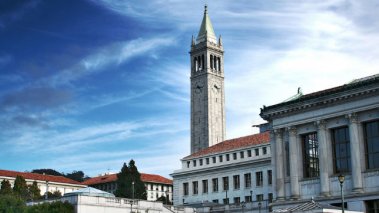Table of Contents
Free Speech Advocates Continue to Call Out UC Berkeley for Shallow Celebration

As the University of California, Berkeley celebrates the 50th anniversary of the Free Speech Movement (FSM) this fall, many remain critical of the university’s failure to protect freedom of speech on campus today. Last month, FIRE reported on UC Berkeley Chancellor Nicholas Dirks’s misunderstanding of the relationship between free speech and civility, as expressed in an email to the university community. Thankfully, he soon sent a follow-up email that provided some clarification. But problems remain at UC Berkeley.
Writing for The Washington Times, Kim R. Holmes reviewed just how free—or not—student and faculty expression is on the UC Berkeley campus:
At today’s Berkeley, political protests are allowed, but only in two designated places. Certain causes — such as defending Israel — are frowned upon and often openly rebuked. A speech code in the student housing guide broadly warns against “verbal abuse” and “hate speech.” Students are urged to report what they think may be “hate crimes.” Posters for events must be submitted five days in advance to a housing review board before they can be posted. Even the Board of Regents of the entire UC system shares some of the blame, disinviting former Harvard President Larry Summers to speak to them because of a controversial statement he once made.
As Holmes notes, FSM veterans are not happy about this outcome, particularly given the university’s claims that it values freedom of expression:
As [former FSM leader Sol] Stern laments, “The great irony is that just as Berkeley now officially honors the memory of FSM, it exercises more thought control over students than the hated ‘multiversity’ that we rose up against a half-century ago.”
Reflecting on his thoughts—then and now—about the FSM, Don Campbell writes in an article for MyCentralJersey.com today about how universities like UC Berkeley misunderstand precisely what rights students actually have and try to control speech using buzzwords:
“Civility,” “respect” and “courteousness” are elitist code words meaning that offending anyone will not be tolerated in the context of free expression. But where does the Constitution guarantee freedom from being offended? For example, I am rarely not offended by something I see or read when I turn on the television or go online. Does that mean I’d like to live in an environment where no one would be permitted to offend me? No, that’s what off-buttons are for.
Decades of experience as a journalist and lecturer, Campbell explains, made him realize “how precious the First Amendment is, and how endangered it has become.”
The Independent Institute’s Aaron Tao is optimistic, however. Earlier this month he praised some of the many millennials who are standing up and making their voices heard on a range of issues, including freedom of speech. He wrote:
The good news, broadly speaking, is that current signs seem to show that many Millennials are mistrustful of authority and support full freedom of expression. A number of recent events are reaffirming the revolutionary spirit of youth. In one Colorado school district, for example, hundreds of students staged walkouts in protest of a new proposed curriculum that ironically downplayed civil disobedience and resistance to authority. In Hong Kong, a largely student-driven (including many as young as twelve) protest movement has mobilized tens of thousands of protestors into the streets to push back against Beijing’s attempt to further control the city’s elections. In the city Milton Friedman once praised as the exemplar of a free market economy, it is thrilling to see youth stand up for individual rights, free elections, and local autonomy instead of demanding for more central government control and one-size-fits-all “solutions” for societal ills.
For another example, look at the Berkeley College Republicans. The student group recently called out UC Berkeley’s student government on its “free speech hypocrisy” with flyers detailing many incidents of censorship and attempted censorship on campus. Berkeley College Republicans President Claire Chiara took to The College Fix to spread the message even further:
There is a strange perversion of free speech taking place on this campus. It’s perfectly acceptable to occupy campus buildings and create pinatas out of the UC president’s image, but that’s only because the individuals in question fall under one school of thought. As soon as someone different comes along, and stirs the pot, they’re pointedly silenced.
All too often, FIRE encounters people who claim to support freedom of speech but abandon those principles when faced with speech they oppose. FIRE commends the Berkeley College Republicans and others who are calling on UC Berkeley to live up to its history and its stated commitments to free expression. Any time the university wants to revise its speech codes to allow students and faculty to fully enjoy their First Amendment rights, FIRE stands by ready to help.
Recent Articles
FIRE’s award-winning Newsdesk covers the free speech news you need to stay informed.

A third of Stanford students say using violence to silence speech can be acceptable

Stanford president and provost cheer free expression in open letter to incoming class

FIRE survey shows Judge Duncan shoutdown had ‘chilling effect’ on Stanford students
